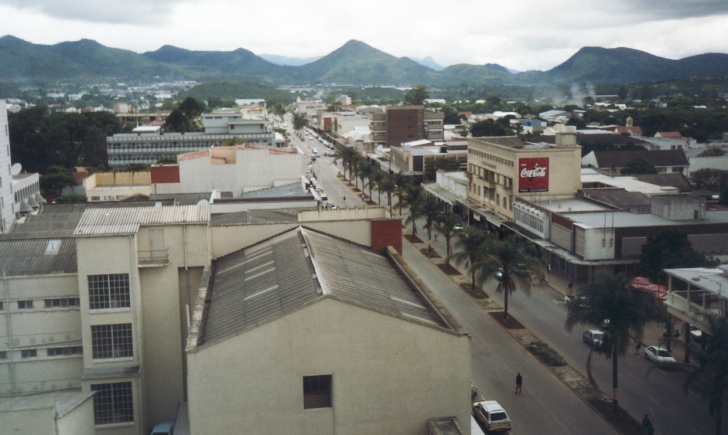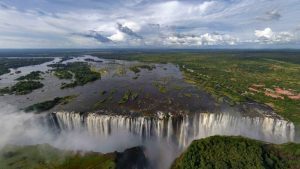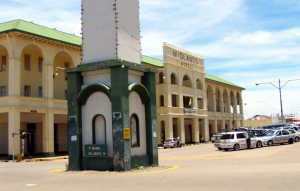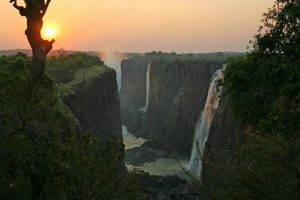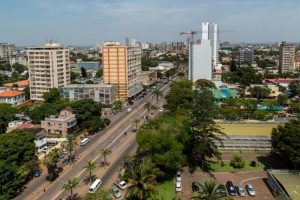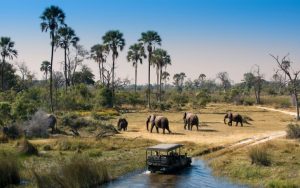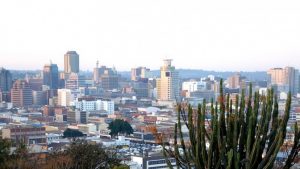 Zimbabwe : Safety by City
Zimbabwe : Safety by City
Zimbabwe - safety as a country
Zimbabwe is a country in Southern Africa.
Mutare is its third-largest city.
The area is known for architectural ruins dating back to 1100 AD.
Soapstone carvings were donated to the British Museum in 1905 to ensure this unique part of history would be preserved.
Although Zimbabwe is a landlocked country, Mutare was once considered a massive hub for trade.
The climate is humid subtropical, with the warmest months being October through January.
However, grand mountains, forests, and exotic trees in the Vumba Mountains and the Nyanga National Park offer relief to tourists.
Zimbabwe is a mystical place to explore, with resorts that offer horseback riding, kayaking, and mountain climbing.
Warnings & Dangers in Mutare

OVERALL RISK: MEDIUM
Health risks like malaria and HIV transmission are always a worry in Zimbabwe. Mutare has excellent medical facilities to treat common illnesses and diseases. These include Mutare Provincial Hospital, the Mutare General Hospital, and the Africa University Health Services. As with any foreign tourist location, crime is present, especially in crowded areas. A medium grade is given for this city in Zimbabwe.

TRANSPORT & TAXIS RISK: HIGH
The safest way to travel around Mutare, Zimbabwe, is by taxi, usually at major hotels. Commuter buses are crowded, poorly maintained, and uninsured. Inexperienced drivers and poor roads add to the uncomfortable ride. Deep potholes and stray livestock can be found on most roads. Rail services can be suspended due to being underdeveloped and poorly maintained. A high grade of risk is given due to low travel choices.

PICKPOCKETS RISK: HIGH
Pickpockets are a high risk for visitors in Mutare, Zimbabwe. Caution should always be taken, especially when leaving banks and in busy tourist spots. Make sure your valuables are tightly secured inside clothing to make grabbing impossible. Do not take any essential papers or more cash than you expect to spend when leaving your hotel.

NATURAL DISASTERS RISK: LOW
Floods and droughts are infrequent occurrences in Zimbabwe. However, they can make your trip very uncomfortable when they do happen. An occasional earthquake may also arise. Pay attention to weather reports before planning a vacation in this part of the globe. Low risk for unpredictable weather can be found in Zimbabwe.

MUGGING RISK: HIGH
Muggings are frequent if the opportunity is given. Night adventures, walking alone, and flashing expensive possessions will alert a mugger of your vulnerability. Tourists and residents need to be on guard in all areas of Zimbabwe. Always travel with a group and visit sights that have security. This is a high-risk country for muggings.

TERRORISM RISK: LOW
Zimbabwe has no recent history of terrorism. However, this could always change suddenly. Authorities keep a watchful eye on protests and those making derogatory remarks against the government. Mutare is at low risk for current acts of terrorism.

SCAMS RISK: MEDIUM
Zimbabwe's economic crisis makes it ripe for scammers. From local government embezzlement to international sponsorship for job placement, scammers are highly active in Mutare. Even if you are a tourist, scammers will try to produce a cost-saving situation that seems too good to be true. Never trust a local, no matter how sincere they seem. Sadly, some people cannot be trusted, but it is true in Zimbabwe. Only deal with reputable companies and never exchange money except at a banking institution. This country earns a medium scam risk rating.

WOMEN TRAVELERS RISK: MEDIUM
Women traveling with a female companion is just as dangerous as a single woman visiting alone. Women are an easy target for muggers, and venturing out after dark should be avoided. Group tours are okay if a taxi from your hotel is used for travel. We set this group at a medium risk rating.

TAP WATER RISK: HIGH
Mutare, Zimbabwe, has frequent blackouts from electricity shortages, affecting municipal water systems. Water rationing is expected, and the quality of water is poor. To avoid drinking tap water, keep bottled water with you when going out. Ask hotel management to keep you informed of critical water situations. The water in all of Zimbabwe is given a high-risk rating.
Safest Places to Visit in Mutare
A must-see is the Vumba Botanical Gardens.
It is peaceful and naturally beautiful.
Filled with crystal-clear rivers, lush green forests, and one-of-a-kind gardens, you can spend an entire day in this paradise.
Self-guided tours are given for your safety, 32 kilometers from Mutare.
Considered generally safe, always stay aware of your surroundings as you wander along trails and watch birds.
A unique guide will lead you through the Eastern Highlands, where waterfalls are abundant, and hiking is an adventure.
You can also visit clubs and bars under your guide’s protective eye during this tour.
The Mutare Museum is another spot frequently visited and enjoyed by tourists.
Here, you can learn about Zimbabwe’s heritage and how many goods are produced.
It is a great place to meet friends and view the culture.
Places to Avoid in Mutare
Compared to other cities in Zimbabwe, Mutare is considered one of the safest.
Like any other city, though, there are rough areas to avoid.
The suburbs of Chikanga and Sakubva have higher crime rates than other areas.
You may feel that visiting during the daytime is okay, but petty theft is still high.
Avoid crowded areas and public transportation where tourists are also preyed upon.
Outlying Mutare regions should be investigated before visiting.
Some of the roughest cities in Zimbabwe include:
- Harare
- Bulawayo
- Victoria Falls
- Hwange National Park
- Gweru
- Kadoma
Safety Tips for Traveling to Mutare
- Keep travel documents accessible, but only carry copies of important papers on your person.
- Store phone numbers for emergency assistance on your phone. The number of the US embassy in Washington, D.C., is 888-407-4747. They can provide information about the closest consulate to Zimbabwe.
- Stay up-to-date on the latest health news through the CDC.
- Review the Country Security Report for Zimbabwe and follow any instructions.
- Same-sex marriage and relationships are illegal in Zimbabwe. You may want to rethink your travel plans to this area if this applies to you.
- Monitor local media for breaking events like political rallies and demonstrations. Steer clear of these areas.
- Select a hotel that is well-established and knowledgeable about the area.
- Never go out after dark. Bring whatever you need to the hotel during the day.
- Make it a habit to travel with a companion, even during the day.
- Do not openly display cash. You never know who is watching.
So... How Safe Is Mutare Really?
Mutare is a small, older town where many residents have lived for years.
It is a hub for moving goods and is not as desperate economically as other towns.
Tourists are welcome, and Mutare takes pride in its history and beautiful natural surroundings.
The police and guides do their best to protect those visiting.
Major crimes, such as murder and armed robbery, are not as prevalent as petty theft and car break-ins.
However, using your common sense and keeping your guard up can help you avoid these situations.
Zimbabwe is a third-world country, defined as having economic instability, high poverty rates, and high mortality rates.
There will be several differences between their culture and your home nation.
The refreshing part of visiting a third-world country is the existence of pure and natural landscapes.
It is essential to understand the standards of life for these foreign residents.
You are accepted as a guest to their country and expected to follow the laws of the land.
Treat residents as if it is a privilege to share their culture and the beauty of their land without being cynical about the lack of expensive, material items.
Most natives are thrilled to have you visit their country to explore and better understand their culture.
There are bad people everywhere, and being alert to signs of danger is no different in Mutare.
It is best to visit tourist areas with like-minded people where guides and guards are on hand to look out for your safety.
Your choice of hotels is vital to having a haven while visiting Zimbabwe.
Read the reviews online and find a good tourist agency to provide input.
How Does Mutare Compare?
| City | Safety Index |
|---|---|
| Mutare | 59 |
| Harare | 66 |
| Gweru | 59 |
| Victoria Falls | 60 |
| Bulawayo | 57 |
| Deadwood (United States) | 80 |
| Sturgis (United States) | 80 |
| Pierre (United States) | 81 |
| Spearfish (United States) | 80 |
| Hill City (United States) | 83 |
| Temuco (Chile) | 31 |
Useful Information

Visas
A visa is required for business and pleasure when visiting any part of Zimbabwe. Obtain visas at the port of entry, where the cost is $50. You must provide proof of residency in your home country and a current passport. The photo on the passport must be less than three months old.

Currency
Zimbabwe's official national currency is the RTGS Dollar (ZWL). There have been many changes to the original Zimbabwe dollar due to turbulent hyperinflation. Due to the sporadic and confusing systems, this nation now accepts a variety of currencies, including the Botswana pula (BWP), Indian rupee (INR), euro (EUR), U.S. dollar (USD), and South African rand (ZAR). Today, the US dollar is Zimbabwe's most widely used currency. Most major banks can do this if you have ZWL from your overseas trip and wish to exchange it for US dollars.

Weather
The weather in Zimbabwe can be unpredictable, but the average patterns are seasonal with hot temperatures. From December through March, rain is expected, with more rainfall in the Northern regions. During April and May, areas dry out with night temperatures falling. June through August are the start of the peak season for clear skies and steady warm weather. The nights get cooler still, however. September through November are scorching. Depending on when you vacation, pack your clothes accordingly.

Airports
Mutare has an airport called Chimoio, which does not service international travel. The closest domestic airport for arriving at Muntare is Harare, some 120 miles away. Beira is the nearest international airport to Mutare. Check with your travel agent for help securing a more reasonable and comfortable flight to Mutare.

Travel Insurance
The Department of Foreign Affairs highly recommends obtaining comprehensive travel insurance when traveling to Zimbabwe. This type of insurance is more expensive than other plans but includes overseas medical costs, including medical repatriation/evacuation, repatriation of remains, and legal costs. The average amount of coverage is $50,000 to $100,000. In addition, flight insurance is also recommended. The average price of flight insurance is around $300.
Mutare Weather Averages (Temperatures)
Average High/Low Temperature
| Temperature / Month | Jan | Feb | Mar | Apr | May | Jun | Jul | Aug | Sep | Oct | Nov | Dec |
|---|---|---|---|---|---|---|---|---|---|---|---|---|
| High °C |
28 | 28 | 27 | 26 | 24 | 22 | 22 | 24 | 27 | 28 | 28 | 28 |
| Low °C |
18 | 18 | 17 | 15 | 12 | 10 | 10 | 11 | 14 | 16 | 17 | 18 |
| High °F |
82 | 82 | 81 | 79 | 75 | 72 | 72 | 75 | 81 | 82 | 82 | 82 |
| Low °F |
64 | 64 | 63 | 59 | 54 | 50 | 50 | 52 | 57 | 61 | 63 | 64 |
Zimbabwe - Safety by City
| City | Safety Index |
|---|---|
| Bulawayo | 57 |
| Gweru | 59 |
| Harare | 66 |
| Mutare | 59 |
| Victoria Falls | 60 |
